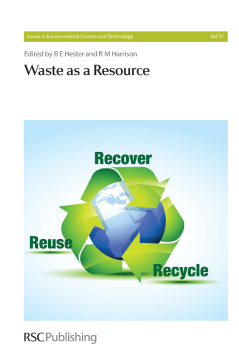
Additional Information
Book Details
Abstract
The volume of waste produced by human activity continues to grow, but steps are being taken to mitigate this problem by viewing waste as a resource. Recovering a proportion of waste for re-use immediately reduces the volume of landfill. Furthermore, the scarcity of some elements (such as phosphorous and the rare-earth metals) increases the need for their recovery from waste streams.
This volume of Issues in Environmental Science and Technology examines the potential resource available from several waste streams, both domestic and industrial. Opportunities for exploiting waste are discussed, along with their environmental and economic considerations. Landfill remains an unavoidable solution in some circumstances, and the current situation regarding this is also presented. Other chapters focus on mine waste, the recovery of fertilisers, and the growing potential for compost.
In keeping with the Issues series, this volume is written with a broad audience in mind. University students and active researches in the field will appreciate the latest research and discussion, while policy makers and members of NGOs will benefit from the wealth of information presented.
The series has been edited by Professors Hester and Harrison since it began in 1994.
Professor Roy Harrison OBE is listed by ISI Thomson Scientific (on ISI Web of Knowledge) as a Highly Cited Researcher in the Environmental Science/Ecology category. He has an h-index of 54 (i.e. 54 of his papers have received 54 or more citations in the literature). In 2004 he was appointed OBE for services to environmental science in the New Year Honours List. He was profiled by the Journal of Environmental Monitoring (Vol 5, pp 39N-41N, 2003). Professor Harrison’s research interests lie in the field of environment and human health. His main specialism is in air pollution, from emissions through atmospheric chemical and physical transformations to exposure and effects on human health. Much of this work is designed to inform the development of policy.
Now an emeritus professor, Professor Ron Hester's current activities in chemistry are mainly as an editor and as an external examiner and assessor. He also retains appointments as external examiner and assessor / adviser on courses, individual promotions, and departmental / subject area evaluations both in the UK and abroad.
